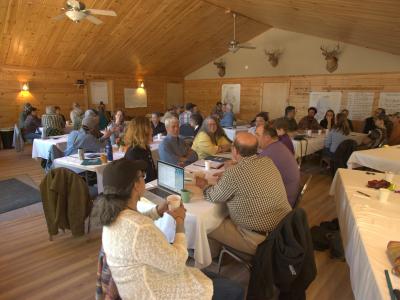At the heart of First Light’s mission is the belief that all of our futures depend on a shared well-being and relationship to place. Beginning with European colonization and continuing into the modern day and the land trust movement in Maine, Wabanaki land care and leadership has been removed and excluded from our shared landscape.
Indigenous science and worldview has a longer record of protecting the rivers, mountains and foods of what’s now called Maine than Western, non-native culture. We know that by bringing Wabanaki voices, knowledge, and history back to the center of land relationships we all can thrive.
The removal of Wabanaki and other Indigenous people and their ideas from a prominent role in land care was intentional and deeply harmful. To repair this harm we must build a center that supports our collective thriving. This will take hard work and deep collaboration.

Wabanaki Commission on Land and Stewardship
The First Light community centers the role of the Wabanaki Commission on Land and Stewardship Psiw ut skitkamiq kignumin (“the whole earth is our home” in Passamaquoddy) in guiding our work. Representing four nations across five tribal communities, the Commission is improving the health and well-being of Wabanaki people by expanding access, management, and ownership of ancestral lands to practice Wabanaki cultures.
Practices that Center
These are examples of ways that First Light and our community practices regularly centering Wabanaki voices and choices. We hope some of these will strike a chord as a value that you can practice, too.
Working interdependently with the Wabanaki Commission on Land and Stewardship
The Wabanaki Commission offers guidance and direction for this work. First Light and the Commission are interdependent organizations, working together towards land return. When requested, we work with Wabanaki nonprofit organizations on land return.
Collaborating with Wabanaki early in decision making
We’ve heard it many times from Wabanaki colleagues: “Nothing about us without us.” We seek to change our typical organizational practices to make space for Wabanaki participation and perspective early in any process or decision. Wabanaki perspectives don’t come at the end of the process, they’re part of it from the beginning.
Do our own work
This means all cultures must take responsibility for the shifts they need to make. At the same time that we are collaborating with Wabanaki people and communities, we’re also taking a clear-eyed look at the way we need to do our own work and carry the burden of relearning and shifting practices in our own non-native community.
Committing to ongoing learning
Changing practices, changing culture, changing land tenure. All of these changes in what we do require changes in how we understand our world. Learning is a necessary and ongoing part of recentering. The entry point for many individuals and organizations in the First Light community is participation in a Learning Journey, where they travel with peers to understand where we’re coming from and dream about where we might go.
Supporting the return of financial resources
The First Light community supports the __Fund__. The fund is a way to redistribute financial resources and support full Wabanaki-led decision-making. Contributions to the fund are made without encumbrance, restriction, or reporting requirement, demonstrating full trust in Wabanaki leadership.
Gathering together on the land
We learn together on the land. Field trips and gatherings move us out of board rooms and Zoom screens, opening space for us to think and relate differently, to each other and the land. The First Light community is committed to annual gatherings to grow relationships with each other as full humans.
Patience
Moving at the “speed of trust” means that we respect the pace that Wabanaki governments and decision makers need to be informed and find consensus. It also respects the time it takes to build true, honest, and trusting relationships.
Challenging assumptions and changing organizational norms
For many non-profit organizations there are real questions about how this work aligns with declared missions and goals. Is this work mission drift or mission maturity? We commit to continued learning and discussion with peer organizations, members, and boards, working collectively to challenge preconceptions and change how our organizations operate.
What's the next step?
Learn from organizations, who have made specific commitments and plans, about how they practice recentering Wabanaki priorities.
